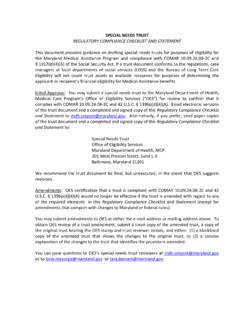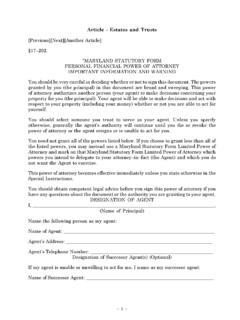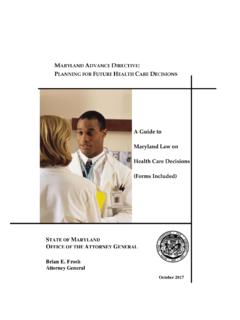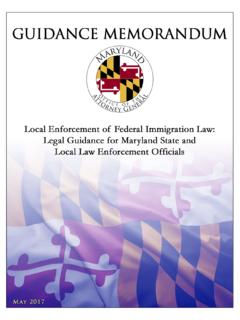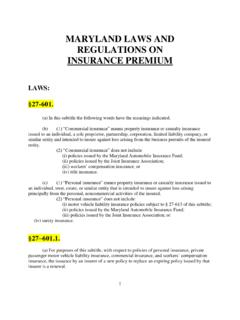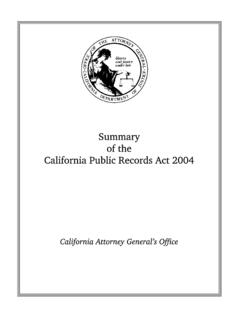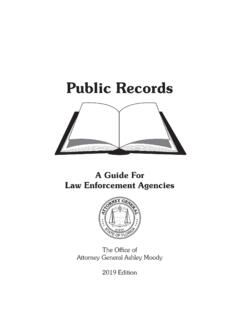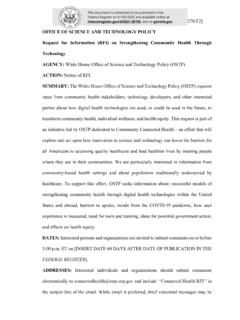Transcription of Maryland Public Information Act Manual
1 Maryland Public Information Act Manual Office of the Attorney General Brian E. Frosh Attorney General Sixteenth Edition 2021 Maryland Public Information ACT Manual OFFICE OF THE Maryland ATTORNEY GENERAL BRIAN E. FROSH ATTORNEY GENERAL 200 Saint Paul Place Baltimore, Maryland 21202 Sixteenth Edition 2021 PREFACE he Maryland Public Information Act is based on the enduring principle that Public knowledge of government activities is critical to the functioning of a democratic society; that a Government of the people, by the people, and for the people must be open to the people. Members of the Public need and deserve complete Information as they make the decisions and form the opinions that determine our future path, and the Act ensures that those needs are met fairly and expeditiously while protecting important privacy rights and other Public policy goals.
2 As Attorney General, I am committed to open access to Information , and to promoting a consistent application of the Act throughout State and local government. The Office of the Attorney General has long worked toward ensuring the correct implementation of the Act, and I am continuing and expanding on that tradition. This Manual is designed to be a resource for a range of users, from members of the Public and the media who request Information , to the government officials who have the responsibility to implement the Act s requirements. The 16th edition of this Manual , like those that precede it, is the work of many talented and committed individuals from the Office of the Attorney General. Special credit goes to former Deputy Attorney General, later Judge, Dennis M. Sweeney for preparing the first several editions, and to former Assistant Attorneys General Jack Schwartz and Robert N. McDonald (now Judge McDonald), as well as to Assistant Attorney General Adam D.
3 Snyder, who assumed responsibility for subsequent editions. This most recent edition has been produced under the supervision of Patrick B. Hughes, the current Chief Counsel for Opinions & Advice. I also wish to provide special thanks to Barbara Bond, who has served as the Attorney General s Public Information Act representative, for her decades of service to the Office of the Attorney General. I also wish to thank the local government officials, the Public Access Ombudsman, members of the private bar, and representatives of the media and open-government advocacy groups for their many constructive suggestions about how best to implement the PIA. In addition to being available in printed version, the Manual is on-line at http://www. Please let me know if you have suggestions for further refinements. Brian E. Frosh Attorney General September 2021 T Table of Contents iv TABLE OF CONTENTS Page Chapter 1: Scope and Agency Responsibilities A.
4 Origin .. 1-1 1. Relation to Common Law .. 1-1 2. Relation to Public Records Statutes of Other Jurisdictions .. 1-2 B. Scope of the PIA .. 1-2 1. Public Agencies and Officials Covered .. 1-2 2. Records Covered .. 1-5 C. Role of the Custodian and Official Custodian .. 1-8 Chapter 2: Right of Access to Records A. Right to Inspect Records .. 2-1 B. Governmental Agency s Access to Records .. 2-4 C. Scope of Search .. 2-5 Chapter 3: Exceptions to Disclosure A. Exceptions Based on Other Sources of Law .. 3-2 1. State Statutes .. 3-2 2. Federal Statutes .. 3-3 3. Court Rules .. 3-4 4. Privileges .. 3-5 5. Local Ordinances and Agency Regulations .. 3-7 B. Required Denials Specific Records .. 3-8 1. Adoption and Welfare Records .. 3-9 2. Library Circulation Records .. 3-10 3. Letters of Reference .. 3-10 4. Personnel Records .. 3-10 5. Retirement Records .. 3-15 6. Student Records.
5 3-16 7. Police Reports Sought for Marketing Legal Services .. 3-16 8. Arrest Warrants .. 3-17 9. Motor Vehicle Administration Records .. 3-17 10. RBC Records Filed With Insurance Commissioner .. 3-18 11. Miscellaneous 3-18 C. Required Denials Specific Information .. 3-19 1. Medical, Psychological, and Sociological Data .. 3-19 2. Home Addresses and Phone Numbers of Public Employees .. 3-21 Table of Contents v 3. Occupational and Professional Licensing Records .. 3-21 4. Trade Secrets; Confidential Business and Financial Information .. 3-23 5. Records of an Individual Person s Finances .. 3-28 6. Records Containing Investigatory Procurement Information .. 3-30 7. Names and Addresses of Senior Center Enrollees .. 3-31 8 Distribution Lists .. 3-31 9. Miscellaneous Information .. 3-32 D. Discretionary Exceptions .. 3-32 1. Inter- and Intra-Agency Memoranda and Letters .. 3-34 2. Testing Data .. 3-38 3.
6 Research Projects .. 3-38 4. Inventions Owned by Higher Education Institutions .. 3-38 5. Certain Proprietary Information Owned by the Maryland Technology Development Corporation or Senior Higher Education 3-38 6. Real Estate 3-39 7. Location of Plants, Animals, or Property .. 3-39 8. Investigatory 3-39 9. Records Relating to Public Security .. 3-45 10. Competitive Position of the Port .. 3-47 11. Global Campus Competitive Services .. 3-48 12. Public Institutions of Higher Education Personal Information .. 3-49 13. Records of Certain 911 Communications .. 3-49 E. Special Court Orders Preventing Disclosure Where No Exception Applies .. 3-50 F. inspection of Any Part of the record that Is Not Exempt .. 3-52 G. Relationship of Exceptions to Discovery .. 3-53 H. Reverse PIA 3-55 Chapter 4: Request Procedures A. Written Request .. 4-1 B. Submitting the Request .. 4-2 C. Time for Response.
7 4-3 D. inspection .. 4-5 E. Records Not in Custodian s Custody or Control .. 4-6 F. Written Denial .. 4-6 G. Judicial Records .. 4-6 Chapter 5: Judicial Review and Alternative Dispute Resolutions A. Judicial Enforcement .. 5-1 1. Limitations .. 5-1 Table of Contents vi 2. Procedural Issues .. 5-1 Venue .. 5-1 Answer .. `5-2 Expedited hearing .. 5-2 Intervention .. 5-2 3. Agency Burden .. 5-2 B. Alternative Dispute Resolution .. 5-4 1. Public Access Ombudsman .. 5-4 2. State Public Information Act Compliance Board .. 5-6 3. Future Changes to Alternative Dispute Resolution .. 5-8 C. Dispute Resolution for Judicial Records .. 5-11 Chapter 6: Copies A. Right to Copies .. 6-1 B. Format .. 6-1 C. Format of Copies of Electronic Records .. 6-2 D. Judicial Records .. 6-4 Chapter 7: Fees A. Search and Preparation Fees .. 7-1 B. Reasonable Fees for Copies .. 7-4 C. Flat Fees .. 7-4 D. Waiver of Fees.
8 7-5 E. Fees for Judicial Records .. 7-9 Chapter 8: Penalties for Noncompliance A. Liability of Agency .. 8-1 B. Liability of Persons Who Violate the Act .. 8-2 1. Criminal Penalties .. 8-2 2. Disciplinary Action .. 8-3 3. Unlawful Disclosure or Use of Personal Records .. 8-3 4. Disclosure of Certain Information to the Attorney General .. 8-4 Chapter 9: Research Access .. 9-1 Chapter 10: Judicial Records .. 10-1 Chapter 11: The Right to Correction or Amendment of Public Records .. 11-1 Table of Contents vii A. Agency Responsibility .. 11-1 B. Enforcement .. 11-1 C. Regulations .. 11-2 Chapter 12: Restrictions on the Creation and Collection of Personal Records .. 12-1 APPENDICES A. Sample Request Letter .. A-1 B. Sample 10-Day Letter (or E-Mail) .. B-1 C. Sample Denial Letter .. C-1 D. Sample Indigency Affidavit .. D-1 E. Text of Public Information Act .. E-1 F. Model Regulations on Public Information Act .. F-1 G. List of Attorney General Opinions.
9 G-1 H. Responding to Requests Under the Maryland Public Act: A Suggested Process .. H-1 I. Access to Government Records Under the Public Information Act .. I-1 J. List of State, County, and Municipal PIA Contacts .. J-1 A. Origin Maryland s Public Information Act ( PIA ), Title 4 of the General Provisions Article ( GP ), grants the Public a broad right of access to records that are in the possession of State and local government agencies. It has been a part of the Annotated Code of Maryland since its enactment as Chapter 698 of the Laws of Maryland 1970 and is similar in purpose to the federal Freedom of Information Act ( FOIA ), 5 552, and the Public Information and open records acts of other states. The text of the PIA is reproduced in Appendix E. The basic mandate of the PIA is to enable people to have access to government records without unnecessary cost or delay. Custodians of records are to provide such access unless the requested records fall within one of the exceptions in the statute.
10 1. Relation to Common Law Public Information statutes such as the PIA expand the limited common law right of the Public in some jurisdictions to inspect certain government records. Originally, the right to inspect Public records in Maryland was very limited under common law, even as to court records. See, , Belt v. Prince George s County Abstract Co., 73 Md. 289 (1890) (while title company was entitled pursuant to its charter to have access to certain court records, it must pay fees required by law). A 1956 Attorney General s opinion noted that the Court of Appeals had held that records could not be inspected out of mere curiosity. 41 Opinions of the Attorney General 113, 113 (1956) (citing Pressman v. Elgin, 187 Md. 446 (1947)); see also Fayette Co. v. Martin, 130 838, 843 (Ky. 1939) ( [A]t common law, every person is entitled to the inspection , either personally or by his agent, of Public records.)

